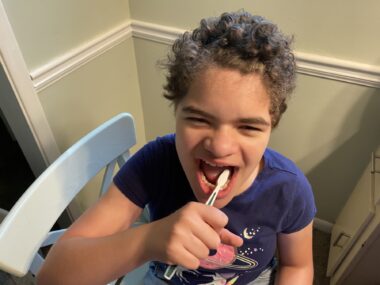How I’ve helped my Angel practice the skill of tooth brushing
Progress may be slow, but my daughter has come a long way
Written by |

Brushing my 13-year-old Angel’s teeth is a chore that’s still a work in progress. The other morning when I took on the task, I gave myself a timeout.
Strum, strum, strum. I rapidly tapped my fingers on the bathroom chair while waiting for Juliana to stop being distracted. And squirming. Tooth brushing is one of those times when I wish that hyperactivity wasn’t a prominent trait for those with Angelman syndrome. As I strummed, I was also waiting for her to open her mouth so I could actually see her teeth.
This is not a process to be rushed.

Juliana does her follow-up brushing after her mom handled the real work. (Photo by Sabrina L. Johnson)
When you’re the parent of an Angel, you quickly realize that everyday tasks will look different for your child than for the average kiddo. If you don’t, you’re setting yourself up for a lot of disappointment and stress. Juliana has performed various activities at her own pace, and I continuously celebrate her progress. We have the following routines down pat and I’m tweaking them as the years roll on.
Not bad, right? Unfortunately, we’re still reaching our stride with tooth brushing. But it’s gotten better. I remember when Juliana would purse her lips together and close them so tight it’s surprising that her jaw didn’t lock.
Back and forth
For a while, however, it was so bad that I enlisted help from her teacher. To improve the process, she made a first-then board. This is a visual that can help nonverbal communicators understand the order of events. The sign helped a lot and showed Juliana the steps she needed to take to get to her favorite activity: eating breakfast.
One sign stayed in her bedroom, and the other went in the bathroom. We kept reinforcing the steps. Finally, she graduated from the lip pursing and moved on from needing the sign.
But what really catapulted her tooth-brushing progress was practicing. Some of what Juliana faces is normal sensory aversion. After struggling with her for so long, the idea finally dawned on me. If we practice other skills, why not practice tooth brushing?
So I set up a workbox with a toothbrush, toothpaste, and one of the first-then signs. When we worked on other skills, like pointing, shapes, and communication, we’d also work on tooth brushing. It worked so well that Juliana’s teacher requested she bring toothpaste and a toothbrush to school this year. They also practice tooth brushing at school, which is another way that Juliana develops this important skill.
For all of her dislike of the toothbrush, Juliana doesn’t have any dental issues. Many Angels have dental problems such as teeth gaps and unusually thin enamel, which means we have to stay on top of our tooth-brushing game. It’s a slow burn, but we’re on it!
I look forward to the day when I say, “Juliana, open,” and she does so willingly.
Note: Angelman Syndrome News is strictly a news and information website about the disease. It does not provide medical advice, diagnosis, or treatment. This content is not intended to be a substitute for professional medical advice, diagnosis, or treatment. Always seek the advice of your physician or other qualified health provider with any questions you may have regarding a medical condition. Never disregard professional medical advice or delay in seeking it because of something you have read on this website. The opinions expressed in this column are not those of Angelman Syndrome News or its parent company, Bionews, and are intended to spark discussion about issues pertaining to Angelman syndrome.







Leave a comment
Fill in the required fields to post. Your email address will not be published.